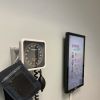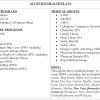Best Ways to Monitor Heart Disease Risk at Home: Simple Methods for Preventing Heart Issues
- The Importance of Monitoring Heart Health
- Essential Tools for Monitoring Heart Disease Risk
- Tracking Blood Pressure at Home
- Using Home Cholesterol Tests
- Monitoring Heart Rate and Rhythm
- Lifestyle Changes to Reduce Heart Disease Risk
The Importance of Monitoring Heart Health
Heart disease is one of the leading causes of death in the United States, with millions of individuals affected by various cardiovascular conditions every year. However, many of these conditions can be prevented or managed effectively through early detection and lifestyle changes. One of the key ways to detect potential heart disease is by regularly monitoring heart health, which can reveal risk factors such as high blood pressure, high cholesterol, and irregular heart rhythms. Fortunately, you don’t need to rely solely on visits to a healthcare provider to track your heart health. There are numerous methods and tools available to monitor your heart disease risk from the comfort of your home.
By regularly checking these indicators, you can catch warning signs early, avoid unnecessary hospital visits, and take proactive steps to improve your heart health. In this article, we’ll explore the best ways to monitor heart disease risk at home and how these methods can help you stay on top of your cardiovascular health.
Essential Tools for Monitoring Heart Disease Risk
To effectively monitor your heart disease risk, you need the right tools. Fortunately, there are several user-friendly devices and technologies that can help you track various aspects of your heart health from home. Below are some of the most effective tools to monitor heart disease risk:
- Blood Pressure Monitor: High blood pressure is one of the primary risk factors for heart disease. A reliable blood pressure monitor allows you to track your readings at home and detect hypertension early.
- Cholesterol Testing Kit: High cholesterol is another significant contributor to heart disease. Home testing kits for cholesterol are available to measure your LDL (bad) and HDL (good) cholesterol levels.
- Heart Rate Monitor: Monitoring your heart rate can help detect irregularities in your heart rhythm and overall heart health.
- Smart Wearables: Devices like fitness trackers and smartwatches offer continuous monitoring of heart rate, activity levels, and even ECG readings for signs of irregular heartbeats.
These tools empower you to stay proactive in managing your heart health. By using these at-home devices, you can regularly monitor your risk factors and make informed decisions about your cardiovascular health.
Tracking Blood Pressure at Home
One of the most crucial aspects of heart disease prevention is monitoring your blood pressure regularly. Hypertension, or high blood pressure, is often called the "silent killer" because it typically has no symptoms but can lead to serious heart conditions like stroke, heart attack, and kidney failure. Fortunately, measuring blood pressure at home is straightforward with the right equipment.
Automatic blood pressure monitors are widely available and are easy to use. These devices typically consist of an inflatable cuff that wraps around your upper arm and a digital display that shows your blood pressure reading. To ensure accurate measurements, it’s recommended to take your blood pressure at the same time each day and follow the manufacturer’s instructions closely. A reading consistently above 120/80 mmHg could indicate the need for a healthcare provider's intervention.
By monitoring your blood pressure regularly at home, you can catch any sudden spikes and work with your doctor to adjust your treatment plan. Early detection can make all the difference in preventing long-term heart damage.
Using Home Cholesterol Tests
Cholesterol is another critical factor in heart disease risk. High levels of LDL (bad cholesterol) can lead to the buildup of plaque in the arteries, which increases the risk of heart attack and stroke. Fortunately, home cholesterol tests provide an easy way to monitor your cholesterol levels from the comfort of your home.
Home cholesterol testing kits typically require a small blood sample, which you can collect using a fingerstick device. The test will measure your total cholesterol, LDL, and HDL levels, providing you with valuable insight into your heart disease risk. While these tests are convenient, it's important to follow up with a healthcare provider for a more thorough evaluation and guidance on how to manage your cholesterol levels if needed.
Monitoring your cholesterol regularly at home can help you make necessary lifestyle changes, such as improving your diet, increasing physical activity, or considering medication to control cholesterol levels effectively.
Monitoring Heart Rate and Rhythm
Heart rate and rhythm play an essential role in overall heart health. A resting heart rate that is too high or too low may indicate underlying issues with heart function. Additionally, irregular heart rhythms, known as arrhythmias, can increase the risk of heart disease and stroke. Monitoring these aspects can help you stay aware of any abnormalities that may require medical attention.
Many wearable devices, such as fitness trackers and smartwatches, offer continuous heart rate monitoring. Some advanced models even include electrocardiogram (ECG) functionality, which can detect abnormal heart rhythms. Regular monitoring allows you to identify changes in your heart rate or rhythm early on, giving you time to consult a doctor before the issue becomes more severe.
If you notice any significant changes in your heart rate or irregularities in rhythm, it’s essential to seek medical advice promptly. Early detection and intervention can prevent more severe heart conditions from developing.
Lifestyle Changes to Reduce Heart Disease Risk
In addition to regularly monitoring heart disease risk, making lifestyle changes is essential for reducing your chances of developing cardiovascular problems. Some key lifestyle changes include:
- Healthy Diet: Eating a balanced diet rich in fruits, vegetables, whole grains, and healthy fats can help reduce cholesterol levels and manage blood pressure.
- Regular Exercise: Engaging in regular physical activity, such as walking, running, or swimming, helps improve heart health and maintain a healthy weight.
- Stress Management: Chronic stress can contribute to heart disease. Practices such as yoga, meditation, and mindfulness can help reduce stress and improve heart health.
- Quit Smoking: Smoking is a significant risk factor for heart disease. Quitting smoking can dramatically reduce your risk and improve your cardiovascular health.
By implementing these lifestyle changes and monitoring your heart disease risk at home, you can take proactive steps to reduce your risk and maintain a healthy heart.




















